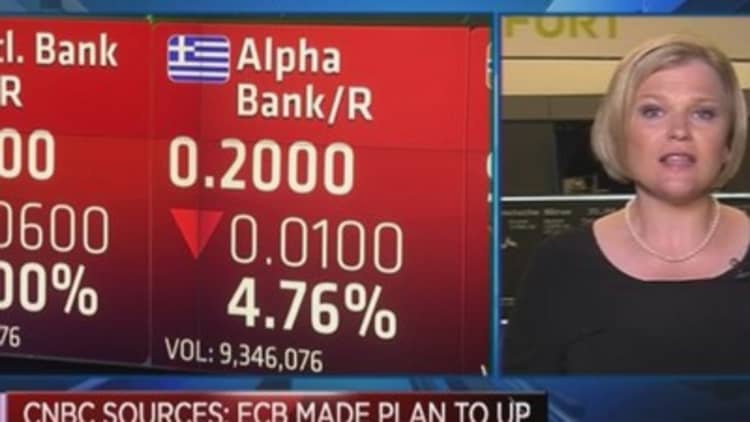
The European Central Bank (ECB) is making contingency plans for both an "orderly" and "disorderly" default by Greece, sources told CNBC Tuesday, as the country's borrowing costs soar and Greece edges closer to bankruptcy.
ECB staff have put together a proposal to increase the haircuts on Greek bank collateral that is offered in exchange for Emergency Liquidity Assistance (ELA) from the Bank of Greece, sources with knowledge of the situation, who have asked to remain anonymous because of the sensitivity of the situation, told CNBC.
The proposal has not yet been discussed by the Governing Council, however. The ECB declined to comment when contacted by CNBC.
On Tuesday, the yield on benchmark ten-year bonds rose mid-morning to 13.619 percent, up from 13.334 percent at the open. Shares of the National Bank of Greece extended losses from Monday and was trading down 8.2 percent. Piraeus Bank, meanwhile, was trading down 11.2 percent and Alpha bank down 3.8 percent.
Currently banks have to use assets as collateral in return for liquidity from Greece's central bank. Those assets are not accepted at their face value, but a "haircut" – the value of which is unknown -- is applied to them. In return, Greek banks get liquidity from the Bank of Greece, which is provided by the ELA.
Greek lenders switched to using the ELA in February, after being cut off from the ECB's direct funding window after the new government stalled the country's bailout program - a condition for access to direct ECB funding. The ELA is ultimately funded by the European Central Bank, however.
Read MoreGreece: The next deadline approaches
Four scenarios
The sources told CNBC that a proposal had been produced looking at four possible funding scenarios for Greece.
One scenario was to keep things like they are, another one was to go back to how it was before November 2014, when the ECB eased its requirements for Greek collateral.
A third scenario, however, considers an "orderly default," which means Greece would default under a formal ECB program -- in this case the staff recommended haircuts of 75 percent. A fourth scenario lays out a "disorderly default," which would mean that the haircut would be 90 percent to factor in the risks.
The comments come amid growing concerns about Greece's financial system.
Greek government ordered state bodies to send idle cash reserves to the country's central bank on Monday, as it scrambled to cover its funding needs. In the coming weeks it not only has debt repayments due to the International Monetary Fund (IMF) and European Central Bank (ECB), but also has domestic wages and bills to pay.
Read MoreWhat would a Greekdefault look like?
While ECB officials have sought to downplay the chances of Greece leaving the euro zone, there is an increasing nervousness about a possible default and subsequent messy exit from the single-currency area.
These worries are also being felt in the market, with the yield on Greek three-year government bonds spiking to 28 percent on Monday - the highest level since Greece was forced into a debt restructuring in 2012.
- Reported by Annette Weisbach, follow her on Twitter @AnnetteCNBC. Written by CNBC's Holly Ellyatt, follow her on Twitter @HollyEllyatt. Follow us on Twitter: @CNBCWorld



